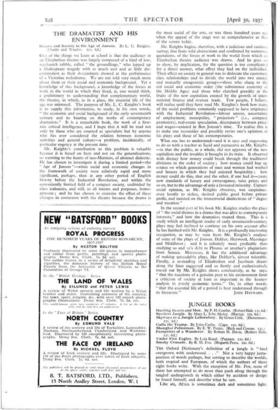JUNGLE BOOKS
Hunting Beasts and Men. By P. H. Combe. (RobertHale. ns. 6d.) Restless Jungle. By Mary L. Jobe Akcley. (Harrap. zos. 6d.) Skyways to a Jungle Laboratory. By Grace Crile. (Heinemann. 12S. 6d.) Gulla the Tramp. By John Carlin. (Cape. 12S. 6d.) Shanghai Policeman. By E. W. Peters. (Rich and Cowan. t5s.) Footprints of a Wanderer. By Robert H. Davis. (Robert Hale. 12s. 6d.) Under Five Eagles. By Lola Kind. (Putnam. 125. 6d.) Smoky Crusade. By R. M. Fox. (Hogarth Press. sos. 6d.) THE Oxford Dictionary's definition of a jungle is " land overgrown with underwood. . . ." Not a very happy juxta- position of words perhaps, but serving to describe-the worlds, both tropical and European, of which the authors of -these eight books write. With the exception of Mr. Fox, none of them has attempted to do more than push along through the tangled undergrowth in which either by accident or design he found himself, and describe what he saw.
Like ale, Africa is sometimes dark and sometimes light, according to the traveller's point of view. Mr. Combe's book is for those who prefer the dark continent. He tells of his adventurous life as a trader in central Africa, then a diamond- pro:.pector in the Congo, and finally as a member of the Rhodesian Mounted Police chasing murderers and witch- doctors. An unpretentious narrative, it fulfils the harmless function of providing a few real-life thrills for the armchair reader.
Mrs. Akeley is the widow of a well-known American naturalist and explorer, and herself an experienced traveller. She set herself the rather ambitious task of obtaining " comprehensive view of the principal areas of South Africa " in eight months. The fact that she was able to study the native and wild life of the Transvaal, Natal, Zululand, Swazi- land and Portuguese East Africa in such a short time proves that the restless jungle offers greater facilities for living and travelling than she would have us suppose. But while readers demand excitement, publishers and therefore most writers will keep Africa dark for as long as possible. Presumably that is why Mrs. Akeley spoils her book by dwelling overmuch on her " narrow escapes."
Mrs. Crile's book (prize for the Silliest Title of the Month) is a more light-hearted affair. With her husband Dr. George Crile, surgeon and scientist, she travelled " skyways " to a camp in the Great Rift Valley of Tanganyika. There, with a few assistants, Dr. Crile captured and dissected specimens of almost every kind .of animal to discover why nature in the raw is seldom unhealthy. Mrs. Crile's rat ter skittish account of their flight and their adventures with animals gives the impression that even when there was danger, it was always great fun. This is a book for those who think animals are rather jolly.
Mr. Carlin also writes about Africa, but his material is more unusual and his manner of presentation more original. He describes a journey undertaken by a German woman ethnologist (Dr. Augusta Melida Johanna ; Gulla for short) and himself into the interior of French Mandated West Africa. Their object was to study the life and language of the Fulanis and Bororos, who have the only written non-semitic language in
Africa. They lived among - them for a year, and collected much of their literature, which, judging from the few transla- tions here given, is of great interest and merit. Of even greater interest at the present moment is what Mr. Carlin has to say about the administration of the mandate in this former German colony. Without suggesting that he exag- gerates, we may conclude that Gulla at least (and through her, Mr. Carlin) was not quite impartial in this matter. They have not a good word for the French, and say that many improvements made by the Germans in roads, rest-houses and other public works have been allowed to fall into ruins by the French, whose aim, they allege, is to reverse the former German policy, whether good or bad. For whatever it i, worth, here is one side of the picture.
There may be two opinions about the darkness of the African undergrowth, but there can only be one about the shadiness of the Shanghai underworld.' Mr. E. W. Peters, wanting excitement, joined the Shanghai Municipal Police Force and was kept busy checking the activities of kidnappers, murderers and drug-traffickers. His book may be recom- mended to thriller fans.
The next three books take us through the undergrowth of Europe. Mr. Robert H. Davis, well-known American journalist, recalls the high spots of a life spent apparently seeing everybody and everything. Unlike most reminiscing journalists, he does not take his life too seriously, and his clever mixture of sentiment and humour makes good enter- tainment. Miss Kind is not so light-handed, but there is plenty of variety in the story of her life. After her escape from Russia in 1917 -she worked for a relief organisation in Warsaw and Vienna, and then became secretary to Isadora Duncan and Essenine, of whom she draws unusually intimate portraits.
And last comes the autobiography of Mr. R. M. Fox, socialist writer and propagandist. To him the factory where he worked as a youth was as terrible as the darkest spot in Africa : " I saw wolf faces, serpent faces, faces of dumb beasts, lifted in the gloom ; snuffling, running, howling creatures of the jungle, peering round- me." A conscientious objector, he went to prison for three years during the War. Afterwards he obtained a scholarship to Ruskin College, Oxford. Mr. Fox is often melodramatic in the manner of the Socialist street-corner orator, but he is always sincere, and alone among these eight authors he sometimes sees beyond



































































 Previous page
Previous page